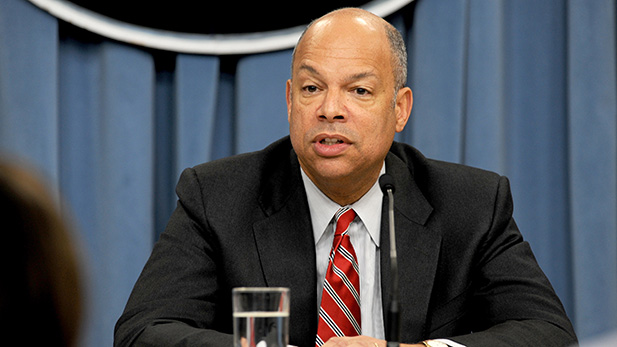 Then-Defense Department General Counsel Jeh Johnson in 2011.
Then-Defense Department General Counsel Jeh Johnson in 2011.Numbers on Border Patrol apprehensions show that 2016 saw changes in how many people were apprehended at the Southwestern border, and who they are and where they came from.
Apprehensions totaled 408,870 in fiscal year 2016, up 24 percent from 2015 and down from the two prior years, reported a press release Monday from the Department of Homeland Security.
The more significant shift came in the origin and demographics of those apprehended attempting to enter illegally, a pattern that started a few years earlier.
Fewer single Mexican men crossed the border illegally while more unaccompanied children and families fleeing gang-controlled areas of Central America came across.
Apprehensions of Central Americans outnumbered those of Mexicans in 2016, a repeat of what happened for the first time in 2014. That’s a result of poverty and violence in Central America, Homeland Security Secretary Jeh Johnson said in the press release.
The number of unaccompanied minors jumped to 59,692 in 2016, an increase of 20,000 from the previous year. The number of family members apprehended rose by nearly 38,000, to 77,674.
Johnson pointed to changing challenges for his agency regarding enforcement priorities, adding that border security is not sufficient on its own in the face of the “push factors” of poverty and violence in Central American countries.
“Walls alone cannot prevent illegal migration,” he said. “Ultimately, the solution is long-term investment in Central America to address the underlying push factors in the region.”
Customs and Border Protection head Gil Kerlikowske told Arizona Public Media earlier this year that no one was ready when the first influx of Central American families showed up on the border in 2014.
“Our Border Patrol stations were absolutely overwhelmed," Kerlikowske said. "We didn’t have health care, we didn’t have food systems in place, nothing. And these kids were coming across, turning themselves in. They weren’t being chased or having to be apprehended. They would immediately turn themselves in to someone in a green uniform."
While there is still controversy over the asylum process for Central American families, Kerlikowske said that for now, his agency is prepared.
The Department of Homeland Security is committed to the humane treatment of migrants, Johnson said in his letter, adding that DHS will continue to provide "an opportunity to assert claims for asylum and other forms of humanitarian relief."

By submitting your comments, you hereby give AZPM the right to post your comments and potentially use them in any other form of media operated by this institution.